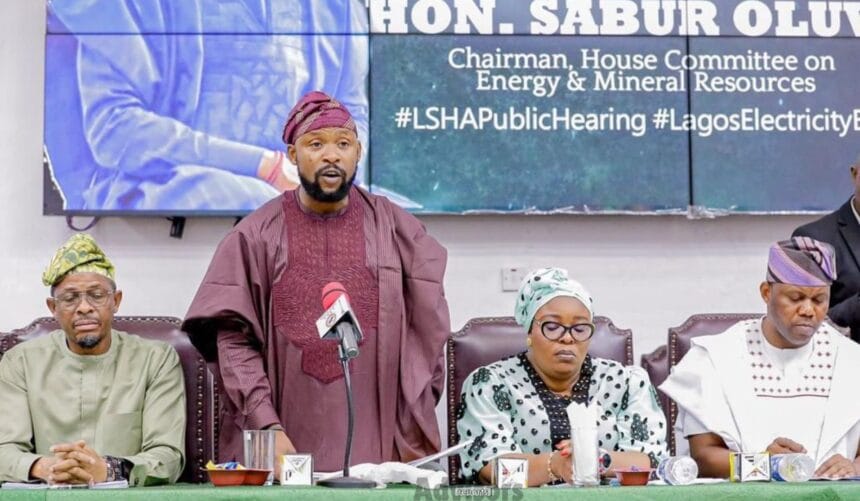“Reliable electricity is not a luxury but a necessity” Hon. Oluwa, Chairman, House Committee on Energy
“By the end of 2025, we hope to celebrate end of blackouts in metropolitan area” -Mr. Ogunleye, Commissioner for Energy and Mineral Resources
“The Law will eventually democratise electricity supply by allowing customers to choose their suppliers” – Engr. Odusote, former Lagos State Commissioner
Oredola Adeola
The Lagos State House of Assembly is set to enact a new electricity industry law to create a competitive and efficient Lagos Electricity Market, aimed at providing affordable, reliable, and sustainable electricity while eventually allowing consumers to choose their suppliers.
This was the highlight of the public hearing of the Lagos State Electricity Bill, designed to address the state’s electricity challenges.
Advisors Reports’ review of the policy document showed that when enacted, the sweeping legislation aims not only to establish a robust, financially viable Lagos Electricity Market but also promises affordable, reliable power for all residents.
Key objectives include fostering investment, promoting clean energy sources, and ensuring competitive market dynamics. With a focus on sustainability and consumer welfare, the law sets out to electrify underserved areas and propel the state towards a greener, more accessible energy future.
A BILL FOR A LAW TO REPEAL THE LAGOS ELECTRIC POWER SECTOR REFORM LAW
2018; TO PROVIDE FOR THE CREATION AND ADMINISTRATION OF THE LAGOS
ELECTRICITY MARKET, ESTABLISH A COMMERCIAL AND TECHNICAL REGULATORY
FRAMEWORK FOR THE LAGOS ELECTRICITY MARKET; ….

Objectives of the Law:
The objectives of this Law are to –
(a) create a commercially and technically sound Lagos Electricity Market that is well-funded and financially viable;
(b) facilitate the delivery of affordable, reliable, sustainable, and modern public electricity access to electricity consumers in the State.
(c) facilitate investment and innovation in the Lagos Electricity Market.
(d) establish a regulatory framework and licensing regime for the conduct of regulated activities in the Lagos Electricity Market and the delivery of services by undertakings to electricity consumers located in the State.
(e) ensure the safe, reliable, and efficient interconnection of the Lagos Electricity Market with the national electricity market.
(f) promote the adoption of diverse, secure, and environmentally sustainable energy sources, energy efficiency, and demand-side management in the State.
(g) facilitate the adoption of clean and modern technology for the provision and delivery of electricity access to electricity consumers in the State;
(h) foster competition in the Lagos Electricity Market and protect the interests and welfare of electricity consumers in the State;
(i) incentivize the behavior of licensees, electricity consumers, investors, and other market participants in the Lagos Electricity Market with the aim of ensuring the delivery of constant, reliable, and cost-efficient electricity supply to electricity consumers in the State;
(j) establish a mechanism for electricity planning in the State;
(k) promote the provision of off-grid solutions for households and micro, small, and medium-scale enterprises in the State;
(l) promote the electrification of unserved and under-served areas of the State; and
(m) contribute to the sustainable development of the State.
Rt. Hon. Mudashiru Obasa, Speaker of Lagos State House of Assembly, who was represented by Hon. Mojisola Meranda, Deputy Speaker, in his comment on the proposed law, stated that the new law aims to comprehensively address issues within the electricity sector, with a primary focus on contributing to the sustainable development of Lagos State.
He said, “This bill, currently before the house, seeks to provide, regulate, and administer electricity services.
“It is timely as electrification plays a crucial role in economic viability and improving people’s well-being. As a responsible Government, Lagos State has decided to establish an agency, market, and fund dedicated to ensuring sufficient electricity access with professional standards and modern technology.”
“The bill reflects our commitment to improving the electricity situation in Lagos State, especially since electricity now falls under the concurrent list. Our proactive approach sets a commendable standard for others to follow.”
“The bill addresses various aspects of the electricity sector, focusing on development, facilitating investment, ensuring affordable, reliable, and sustainable access to energy, and promoting the adoption of clean and modern energy sources,” Obasa said.
The Speaker further emphasized that the bill also establishes a mechanism for electricity planning and encourages the adoption of clean and modern technology energy sources.
According to him, “Lagos State is proactive in leveraging the shift of electricity to the concurrent list.
“The bill is crucial for the state’s growth, and I urge all stakeholders to support its passage,” the Speaker pleaded.
Hon. Sabur Oluwa, Chairman of the House Committee on Energy, in his comment on the proposed bill, stated that the bill proposes a commercial and technical regulatory framework for the Lagos Electricity Market to ensure reliable and universal electricity access for all residents.
“It outlines the creation of the Lagos State Electrification Agency to manage public electricity works and infrastructure, alongside the Lagos State Electrification Fund. These institutions will play pivotal roles in delivering reliable electricity to unserved and underserved areas of our state,” Oluwa explained.
Chairman of the House Committee on Energy therefore emphasised that through those initiatives, Lagos State Government aims to bridge the electricity supply gap and enhance the quality of life for all Lagosians.
He said, “Reliable electricity is not a luxury but a necessity.”
Mr. Biodun Ogunleye, Commissioner for Energy and Mineral Resources, in his contribution on the document, said, “We aim to reach a point where we have a competitive market, enabling us to de-risk the market further and attract more funds. We need to remove the challenges that have limited our progress toward eliminating blackouts.
According to him, “By the end of 2025, we hope to celebrate the end of blackouts in the metropolitan area.”
He further said, “Governor Sanwo-Olu has emphasized that electricity should be available to all. While we must pay for electricity, we should use it responsibly, ensuring its availability and leveraging it to improve our standard of living and benchmark our economy globally. Our goal is to transform Lagos into a 21st-century city.
“The Lagos State Electricity Bill is crucial for this transformation. It leverages the 2023 Electricity Act and constitutional amendments that democratize electricity administration.
“The 21-part Bill outlines the roles of the Lagos State Government and the Ministry of Energy. It establishes the Lagos State Electricity Regulatory Commission (LSERC) and covers licensing, tariff regulations, market standards, consumer protection, renewable energy, and the Lagos State Electrification Agency.”
Engr. Lere Odusote, the former Lagos State Commissioner for Energy and Mineral Resources, under whom the proposed bill was drafted and painstakingly worked on, in a chat with Advisors Reports, commended the 10th House of Assembly and the Lagos State Government for allowing public input to refine the Bill.
He noted that the bill was previously sent to the 9th House of Assembly but was not considered at that time due to potential conflicts with the existing federal law, EPSRA, despite not conflicting with the constitution.
He stated, “It has come to be now, and I expect that the law will be passed largely intact. The aim is to eventually democratize electricity supply by allowing customers to choose their suppliers.
“This should enable the proper accounting of electricity supplied and distributed in Lagos and aid economic projections and planning,” the former Commissioner said.
MAJOR HIGHLIGHTS OF THE PROPOSED BILL
Lagos Independent System Operator (ISO)
One of the major aspects of the proposed regulations is the Lagos Independent System Operator (ISO) which is expected to be established as a company limited by guarantee within 18 months of the law’s commencement, overseen by the Ministry in consultation with the Commission and stakeholders.
The ISO will receive a license for operation, adhering to regulatory frameworks for governance and membership criteria.
It will be structured as a non-profit entity and will reinvest profits into its operations, ensuring independence from market influences.
The Commission will oversee system operations to maintain reliability in the Lagos Electricity Market during the transitional period.
The Lagos ISO’s functions include:
- Performing its duties in an open, fair, reasonable, objective, and non-discriminatory manner to promote efficient market behavior.
- Ensuring non-discriminatory treatment of all licensees and market participants.
- Providing information equally and consistently to all licensees and market participants.
- Exercising powers and duties as outlined in the Market Rules.
- Complying with service and performance criteria specified in its license and adhering to regulations, directives, and orders issued by the Commission.
* Lagos State Electrification Fund
Another aspect of the bill as reviewed by Advisors Reports, when passed into law is the establishment of the Lagos State Electrification Fund, which is expected to be managed by a dedicated Agency, to enhance power supply across the state.
The Fund which will be sourced from various channels, including government budget allocations, surplus revenues, fines, electricity levies, donations, and earnings from investments.
The Board of the Agency will ensure transparent and independent management of the Fund, with strict separation from the Agency’s operational budget. Contributions in foreign currency will be retained in their original form until utilized. The Fund’s assets will strictly support electrification projects, excluding any recurrent or capital expenditures of the Agency.
Each year, the Agency’s Board will present an annual plan by February, detailing proposed projects and costs for approval by the Energy Commissioner. The Fund will be used to implement off-grid electrification strategies, support electricity access in underserved areas, expand the state grid, and invest in off-grid solutions, with administrative costs capped at 0.75% of the Fund’s balance.
Objective and transparent guidelines for Fund management and project selection will be developed in consultation with the Energy Commissioner and stakeholders. Additionally, special purpose funds may be established with development partners, subject to the Governor’s approval.
No legal actions can be taken against the Fund’s assets, ensuring its protection. The Agency will maintain accurate accounts and records, subject to annual audits by approved auditors within three months of each financial year’s end.




